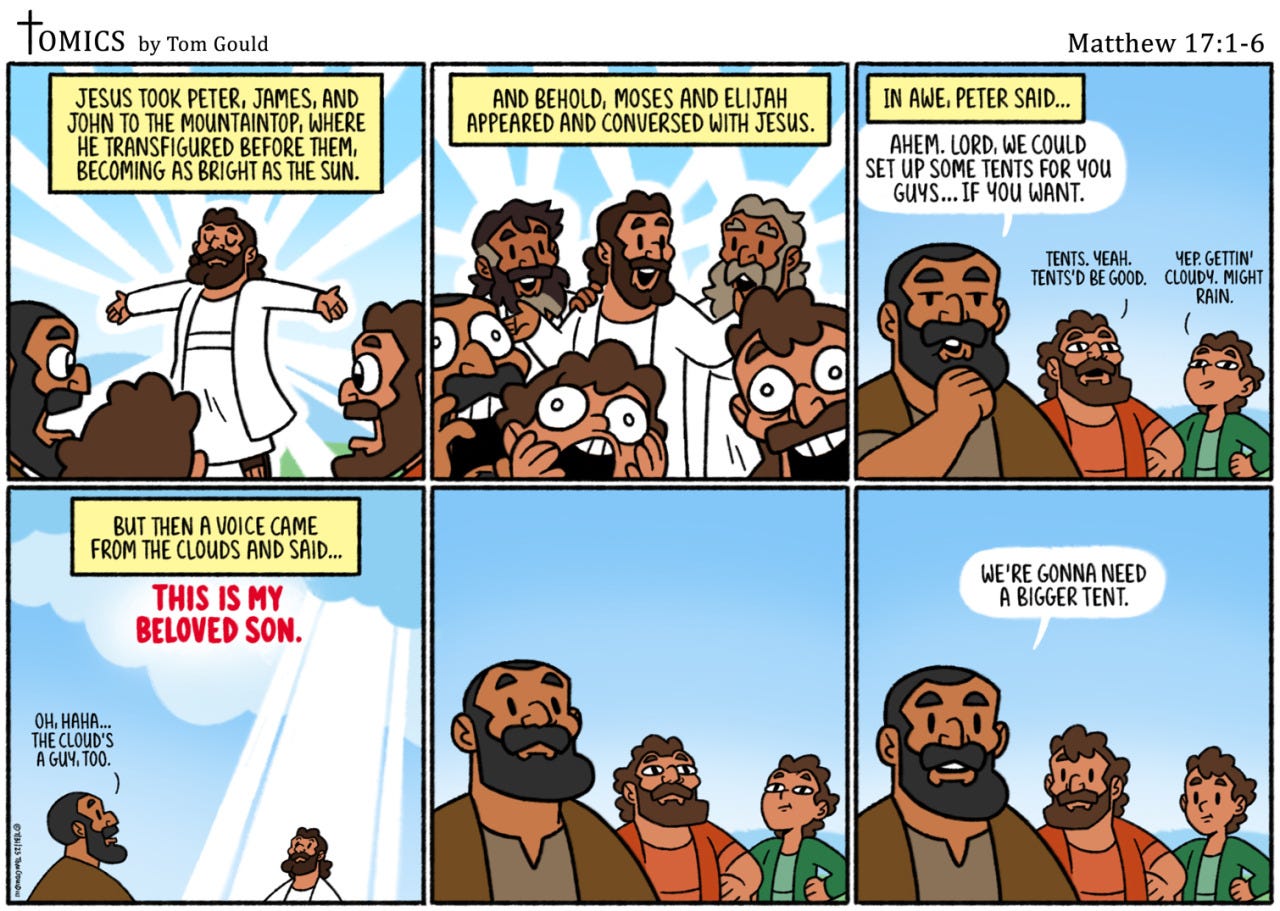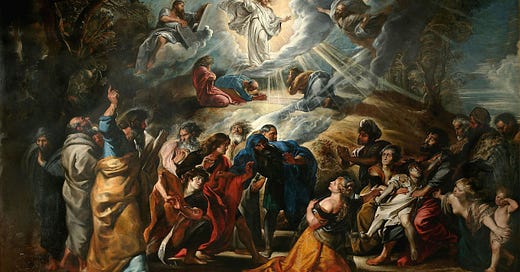Today's readings are all about how God chooses to reveal Himself to us, in His own time and in unexpected ways, from Abraham seeing a pillar of flame to James, John, and Peter witnessing the Transfiguration.
“Transfiguration” means to change the outward appearance. Jesus allows these three apostles to see who He really is. Later, after Jesus' death and resurrection, the disciples on the road to Emmaus don't even recognize Jesus at first.1 But He's still Jesus, which is probably why he appears “dazzling white” in today’s Gospel. The good news, Paul assures us, is that we'll get to experience a similar transfiguration in the next life.
Reading I
Gen 15:5-12, 17-18
The Lord God took Abram outside and said, “Look up at the sky and count the stars, if you can. Just so,” he added, “shall your descendants be.” Abram put his faith in the LORD, who credited it to him as an act of righteousness.
He then said to him, “I am the LORD who brought you from Ur of the Chaldeans to give you this land as a possession.”
“O Lord GOD,” he asked, “how am I to know that I shall possess it?”
He answered him, “Bring me a three-year-old heifer, a three-year-old she-goat, a three-year-old ram, a turtledove, and a young pigeon.” Abram brought him all these, split them in two, and placed each half opposite the other; but the birds he did not cut up. Birds of prey swooped down on the carcasses, but Abram stayed with them. As the sun was about to set, a trance fell upon Abram, and a deep, terrifying darkness enveloped him.
When the sun had set and it was dark, there appeared a smoking fire pot and a flaming torch, which passed between those pieces. It was on that occasion that the LORD made a covenant with Abram, saying: “To your descendants I give this land, from the Wadi of Egypt to the Great River, the Euphrates.”
Cutting up animal sacrifices was a particular form of treaty in the ancient world, with a strong meaning: “If I violate this trust, let me meet the same fate as these animals.” It's kind of an extreme version of “cross my heart and hope to die.”
Abraham waited beside these bisected, rotting, probably stinking corpses, but he didn't know why. He had no idea what God's plan was. How could he? But his patience paid off, when God revealed His power... at the end of the day.
Sometimes we have to face uncomfortable situation, and just wait. God comes to us in His own time, but when He does, it is glorious.
Responsorial Psalm
Ps 27:1, 7-8, 8-9, 13-14.
R. (1a) The Lord is my light and my salvation.
The LORD is my light and my salvation;
whom should I fear?
The LORD is my life’s refuge;
of whom should I be afraid?
R. The Lord is my light and my salvation.
Hear, O LORD, the sound of my call;
have pity on me, and answer me.
Of you my heart speaks; you my glance seeks.
R. The Lord is my light and my salvation.
Your presence, O LORD, I seek.
Hide not your face from me;
do not in anger repel your servant.
You are my helper: cast me not off.
R. The Lord is my light and my salvation.
I believe that I shall see the bounty of the LORD
in the land of the living.
Wait for the LORD with courage;
be stouthearted, and wait for the LORD.
R. The Lord is my light and my salvation.
The psalmist has faith in God, trusts in salvation. But he's also prepared to ask God for help. We don't command God, but God doesn't force Himself on us, either. So the Psalmist asks for help, in full faith that that request will be answered.
The last line reminds us that we probably will have to wait, though. We can never tell how or when God will reveal His presence in our lives.
Reading II
Phil 3:17—4:1
Join with others in being imitators of me, brothers and sisters, and observe those who thus conduct themselves according to the model you have in us. For many, as I have often told you and now tell you even in tears, conduct themselves as enemies of the cross of Christ. Their end is destruction. Their God is their stomach; their glory is in their “shame.” Their minds are occupied with earthly things. But our citizenship is in heaven, and from it we also await a savior, the Lord Jesus Christ. He will change our lowly body to conform with his glorified body by the power that enables him also to bring all things into subjection to himself.
Therefore, my brothers and sisters, whom I love and long for, my joy and crown, in this way stand firm in the Lord.
As their name implies, the Philippians lived in Philippi , a Roman outpost in Macedonia. They were themselves Roman citizens, living outside of their homeland. And thus Paul reminds us where our true citizenship is: heaven. We will some day get to return home to our Father, thanks to Jesus Christ.
Verse Before the Gospel
Mt 17:5
From the shining cloud the Father’s voice is heard:
This is my beloved Son, hear him.
This is an interesting escalation during the scene of the transfiguration. Peter, James, and John saw Jesus transfigured, and witnessed him speaking with Moses and Elijah. You'd think that would be enough, but then the Voice of God Himself speaks directly to them.

As with Abraham in the first reading, the Apostles didn't know how they were going to hear from God, but they certainly trusted they would somehow.
Gospel
Lk 9:28b-36
Jesus took Peter, John, and James and went up the mountain to pray. While he was praying his face changed in appearance and his clothing became dazzling white. And behold, two men were conversing with him, Moses and Elijah, who appeared in glory and spoke of his exodus that he was going to accomplish in Jerusalem.
Peter and his companions had been overcome by sleep, but becoming fully awake, they saw his glory and the two men standing with him. As they were about to part from him, Peter said to Jesus, “Master, it is good that we are here; let us make three tents, one for you, one for Moses, and one for Elijah.” But he did not know what he was saying.
While he was still speaking, a cloud came and cast a shadow over them, and they became frightened when they entered the cloud. Then from the cloud came a voice that said, “This is my chosen Son; listen to him.”
After the voice had spoken, Jesus was found alone. They fell silent and did not at that time tell anyone what they had seen.
The transfiguration gives us some indication what bodily resurrection will be like. (As Paul says in the second reading, “He will change our lowly body to conform to his glorified body.”) Peter, James, and John see the transfiguration happen, but they don't fully understand. Peter offers to make three, equal tents, inadvertently putting Moses and Elijah on the same level as Jesus. Then, as noted above, God corrects him verbally.
Jesus is preparing them for all the things that will happen over Holy Week, just like Lent prepares us in our current time. It’s a nice reminder that, although this is a solemn time, we have glory to look forward to (when God wills it).




